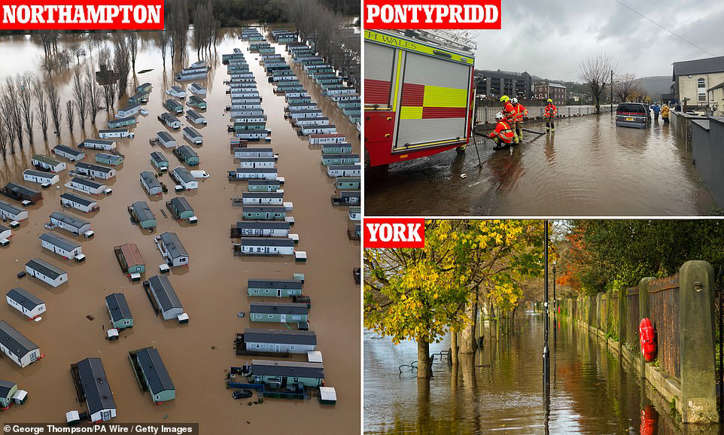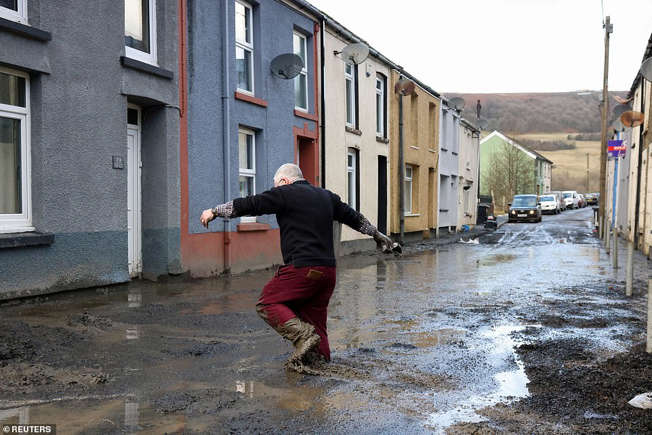Storm Bert offers stark reminder of UK’s underfunded flood defences
Spending shortfall has seen 500 of 2,000 new protection projects abandoned despite growing severity of disasters
Helena Horton and Sandra Laville
Tue 26 Nov 2024
The Guardian
Storm Bert caused devastating flooding in the UK this week, taking lives and destroying homes and businesses in what has become a frequent occurrence during autumns and winters.
Climate breakdown is making these extreme weather events more probable. Extreme rainfall is more common and more intense because of human-caused global heating across most of the world, and particularly in Europe. This is because warmer air can hold more water vapour, and flooding has become more frequent and severe as a result. But floods are also hitting communities with more intensity because of inadequate, underfunded flood defences.
In Wales, we’re one more flood away from another disaster like Aberfan
Owing to a funding shortfall, the number of properties that will be better protected from flooding by 2027 was last year cut by 40%, and 500 of 2,000 new flood defence projects have been abandoned. The Environment Agency (EA) has said it is £34m short of its expected budget. The former chair of the EA Emma Howard Boyd said on Tuesday that during her time at the agency “one of the areas that we struggled with getting more money to … was on the maintenance of our flood defences”.
In parliament on Monday, the environment secretary, Steve Reed, blamed the previous government for a “difficult economic inheritance”, making it harder to find large amounts of funds to invest in flood protection measures.
Prof Hannah Cloke, a professor of hydrology at the University of Reading, said: “Our current approach to flood protection isn’t keeping pace with the escalating risks posed by climate change. We have sophisticated forecasting systems and emergency responses but we’re falling behind on the crucial infrastructure needed to protect communities in the first place.”
Floods and river levels are increasingly testing the capability of the existing defences , including those that have recently been upgraded.
Some believe the entire modelling system used to try to make precise predictions of where rivers will rise, and by how much, in order to warn people, is being tested itself because of the extremes brought on by climate change.
“It’s very challenging,” said Dave Throup, who spent many years on the frontline for the EA in Herefordshire and Worcestershire. “Our flood forecasting is pretty good in the UK, it is quite sophisticated. We have the flood forecast centre where the Met Office and hydrologists from the EA sit alongside each other, but it is never going to be a precise science.
“A lot of the models are based on previous experience and they are not coping with the new climate reality. It is like most things with climate change – the climate is changing faster than the environment or the models or the flood defences. We are running to try to catch up, it is very difficult.”
Funding for the Department for Environment, Food and Rural Affairs (Defra) will reduce by 2% next year. Reed has committed £2.4bn to flood defences over the next two years, but has not answered when asked if this is part of the £5.2bn committed by the previous Conservative government from 2021-27. The National Audit Office calculated that the previous government underspent this budget, meaning most of it would have to be used in the remaining years.
The government has convened a flood resilience taskforce to try to spend this money more effectively. It has met once since July and its next scheduled meeting is next year, by which time more floods are likely to have occurred.
Cloke said: “The mathematics of flood defence is quite simple. Every pound we don’t invest now in robust flood protection will cost us several pounds in damage repair later. Setting up new taskforces while cutting funding to environment agencies such as Defra is like rearranging furniture on a sinking ship.”
Nature-based solutions are needed, too. Many communities that face floods, particularly in parts of Yorkshire, Cumbria and Wales, are directly underneath upland areas that have been burned and grazed for farming and grouse shooting over the years. This destroys the peat that makes up the uplands and usually acts like a giant, mossy sponge, holding water. When peatland is degraded, it cannot soak up the rain, meaning it cascades to the communities below.
Tom Lancaster, a land, food and farming analyst at the Energy and Climate Intelligence Unit, said: “Evidence suggests that one of the best ways to tackle flood risk for homes and businesses is to reduce the speed at which water makes it to the river in the first place. The most cost effective way to do this is to use nature, creating new woodlands to slow the flow, restoring upland peatland to act as a giant sponge and new wetlands to store water and redirect it away from communities.”
The severity of floods predicted to hit the UK as the climate continues to break down is unlikely to be mitigated by defences alone. Communities need to be prepared for emergencies, Dr Carola Koenig, from the Centre for Flood Risk and Resilience at Brunel University of London, said. “We need to prepare our communities for floods and provide training at community level. If you have a large building where people work, staff practise fire drills to make sure everybody knows what to do in the event of fire. We are not doing this when it comes to flooding, but it is something that all communities need to work towards.
“People need to know what to do with their electricity in the event of flooding. They need to have an emergency bag packed and ready to go if they need to leave their home, and they need to know where their next safe haven area is in case of severe flooding. Also, emergency evacuation plans need to be in place and need to be practised for people with mobility issues, such as hospital patients or care home residents.”
Doug Parr, the chief scientist at Greenpeace UK, suggested other ways for the government to raise funds: “The government should look to those big polluters most responsible for fuelling the climate crisis, starting with the fossil fuel industry. Ordinary people shouldn’t be forced to foot the bill for the damage the oil and gas giants have caused.”
Tom Lancaster, a land, food and farming analyst at the Energy and Climate Intelligence Unit, said: “Evidence suggests that one of the best ways to tackle flood risk for homes and businesses is to reduce the speed at which water makes it to the river in the first place. The most cost effective way to do this is to use nature, creating new woodlands to slow the flow, restoring upland peatland to act as a giant sponge and new wetlands to store water and redirect it away from communities.”
The severity of floods predicted to hit the UK as the climate continues to break down is unlikely to be mitigated by defences alone. Communities need to be prepared for emergencies, Dr Carola Koenig, from the Centre for Flood Risk and Resilience at Brunel University of London, said. “We need to prepare our communities for floods and provide training at community level. If you have a large building where people work, staff practise fire drills to make sure everybody knows what to do in the event of fire. We are not doing this when it comes to flooding, but it is something that all communities need to work towards.
“People need to know what to do with their electricity in the event of flooding. They need to have an emergency bag packed and ready to go if they need to leave their home, and they need to know where their next safe haven area is in case of severe flooding. Also, emergency evacuation plans need to be in place and need to be practised for people with mobility issues, such as hospital patients or care home residents.”
Doug Parr, the chief scientist at Greenpeace UK, suggested other ways for the government to raise funds: “The government should look to those big polluters most responsible for fuelling the climate crisis, starting with the fossil fuel industry. Ordinary people shouldn’t be forced to foot the bill for the damage the oil and gas giants have caused.”
UK forecasters face backlash over 'insufficient' Storm Bert warning




©George Thompson/PA Wire / Getty Images
Weather forecasters have been criticised for providing inadequate warnings before severe flooding after Storm Bert lashed the country, leading to at least five deaths. Rising waters today in the wake of the storm led to 1,000 people being evacuated from a caravan park in Northamptonshire.
Weather forecasters have been criticised for providing inadequate warnings before severe flooding after Storm Bert lashed the country, leading to at least five deaths. Rising waters today in the wake of the storm led to 1,000 people being evacuated from a caravan park in Northamptonshire.
No comments:
Post a Comment